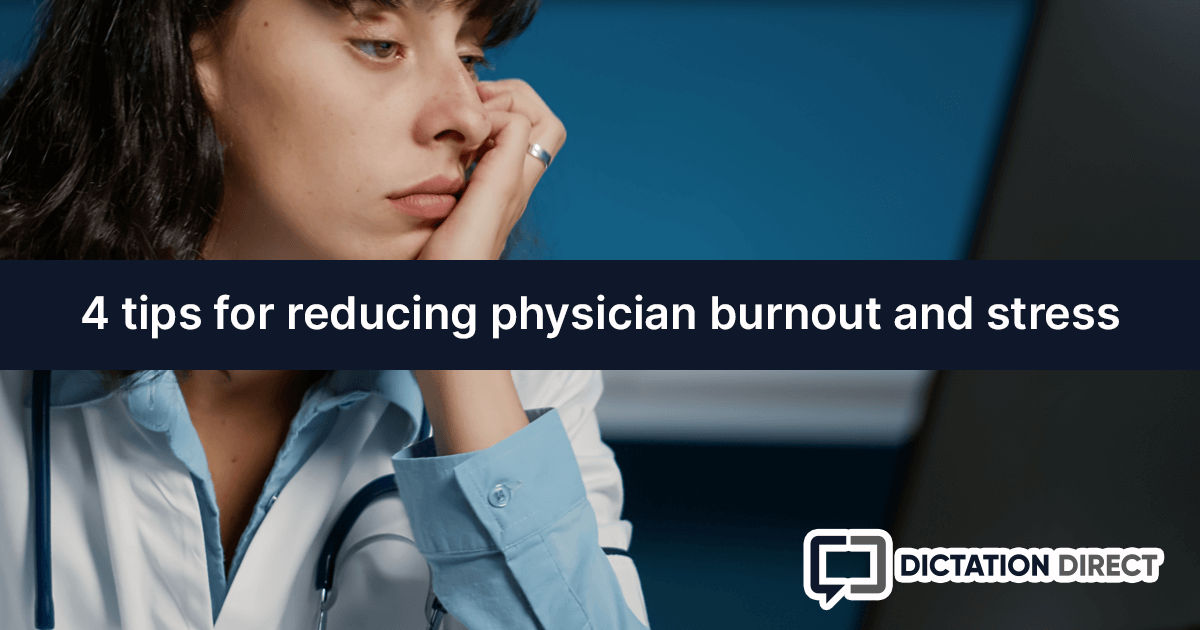
Healthcare workers deal with a tremendous level of stress due to their demanding workload. As we’ve discussed before, complications caused by the pandemic, staff shortages, and burnout compound into stressful surroundings. The importance of medical work demands attention, and emergencies don’t take breaks.
But, like everyone, medical professionals have limits, and when overwhelmed by a constant, demanding environment combined with the importance of their work, it adds up. Burnout leads to worse performance, depression, and indifference toward medicine, which can severely impact patient care and all other aspects of work. Therefore, it’s critical healthcare professionals take advantage of resources to help reduce their stress.
While we don’t have a single, magic answer that can definitively deal with all stress, Dragon Medical One believes in benefitting healthcare workers. As such, we’ve assembled a small list of tips to help address stress and help create habits for a healthier outlook.
Stress, even in a medical environment, isn’t always one primary factor. It’s often a multitude of demanding situations and events creating a layer of problems. Therefore, building good habits and addressing each layer is fundamental for reducing stress.
However, many of the primary stress factors for healthcare are difficult to avoid or directly address since emergency scenarios are unpredictable.
Oh no, not caffeine! But, it’s true. While a cup of coffee can get the motors running, too much caffeine is linked to anxiety and can elevate your heart rate. It also alters chemical receptors like serotonin which exacerbates mood problems and depression, both worsened by heavy stress.
Decrease your intake of caffeine if you find yourself going for that third daily coffee, and hydrate instead with water.
Separating yourself from stress factors is another aspect of improving mental health. Not only does it give you separation from the stress-inducing surroundings but gives you a much-needed break too. Routine stretching and periodic exercise both directly aid mental and physical health.
In the medical sector, finding space where you can relax is crucial. It isn’t always possible, but take time for yourself as needed.
Lost in a sea of stressful and demanding conditions is personal care and preservation. It’s vastly easier to fall into bad habits when your mind is on work. We don’t consider the foods we ingest in the chaotic whirlpool of medical labor, and that’s where we lose track of good habits. It’s harder to prepare large, fulfilling meals when you’re short on time, and no one is exactly looking forward to cooking an elaborate dinner after a long shift.
Some ways to help with this are meal prep and making several simple, easy recipes while planning them out for the week. Also, avoid sodas and other sweetened drinks, as they only dehydrate you.
This one might sound odd, especially when posed to doctors. But hypertension is a dangerous problem for most Americans, physicians included. High stress can cause hypertension, and you likely won’t notice as there are few immediate symptoms, if any. And if there are, it indicates hypertension has escalated to a dangerous level.
Given the high degrees of stress you might be experiencing, it’s worth checking on. If you’re dealing with headaches that don’t go away, higher anxiety and even a sensation of “unwellness” could point to hypertension.
Even as you attend to others, it’s crucial to watch your health. Medical professionals should take advantage of the tips we’ve offered (and others) to help decrease stress whenever possible.